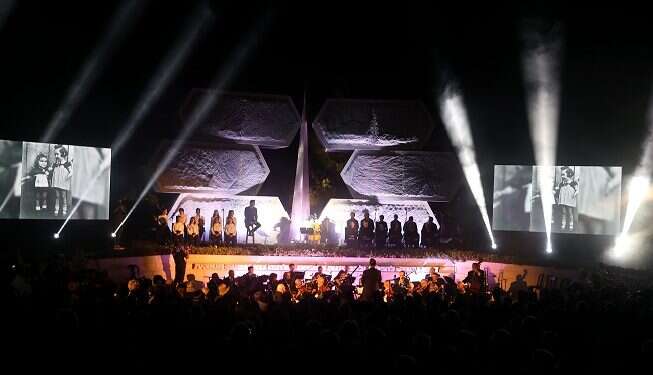Seventy-five years after the Jews in the Kovno (Kaunas) Ghetto orchestra in Lithuania held a clandestine concert, it was re-enacted in Israel on Monday.
During the Holocaust, the Jewish police force in the ghetto would hold concerts as a means of maintaining normalcy, with tacit Nazi approval, holding the events in a building used by the Slabodka Yeshiva.
But one concert was held without the German authorities' approval: a Zionist-themed concert held on July 24, 1943.
The concert brought together rival Zionist groups in the ghetto, which sang together about the return to the Land of Israel, in eastern European melodies as well in what they referred to as Yemenite tunes.
The concert was carried out to mark the anniversaries of the deaths of Zionist leader Theodor Herzl and famed Jewish poet Chaim Nachman Bialik, who died on the same day 30 years apart. The orchestra contained some of the most prominent Lithuanian musicians prior to the war.
"The ghettos in Europe were awash with rumors in late 1942 that a Jewish state had been founded in the Land of Israel," said Dr. Lea Prais, a leading scholar at Yad Vashem.
"They were just rumors, but the fact that we had a Zionist concert at this point attests to the strong yearning at that point [for a Jewish state]."
Prais said some of the Jews were not happy that German officers would be attending the concerts.
"Some in the ghetto were not too enthused about having those concerts, and asked out loud, 'Why do we need all this? Is this for the Germans?'" Prais said.
As in some other ghettos, the Jews in Kovno secretly preserved documents on their community and buried the archives pertaining to the orchestra. The documents were discovered by chance when the foundations for a new building were built in the 1960s.
Rami Neudorfer, a scholar of Jewish history completing his doctorate, pored through the documents and stumbled across invitations and music sheets from the secret concert by the ghetto orchestra, which comprised around 30 musicians and vocalists. The participants made it a point that the songs at that particular concert would be entirely in Hebrew, unlike other concerts, which included Yiddish songs.
The concert on Monday was attended by the daughter, granddaughter and great-granddaughter of conductor and concert organizer Michael (Misha) Hofmekler. Hofmekler was deported to the Dachau concentration camp but survived the Holocaust and made aliyah. He died in 1965 and is buried in Israel.
His granddaughter Einat Ginzburg Azulay told Israel Hayom: "I was extremely moved by the concert, because all of what I saw in the pictures suddenly came to life. I could imagine my grandfather being on stage and conducting. The singing of 'Hatikvah' at the end was particularly moving. It gives me shivers to think about how daring they were to engage in such activity," she said.
At the time of the original concert, "Hatikvah" was the song of the Zionist movement; it became Israel's anthem when the state was established in 1948. The re-enacted concert on Monday ended with the song.




